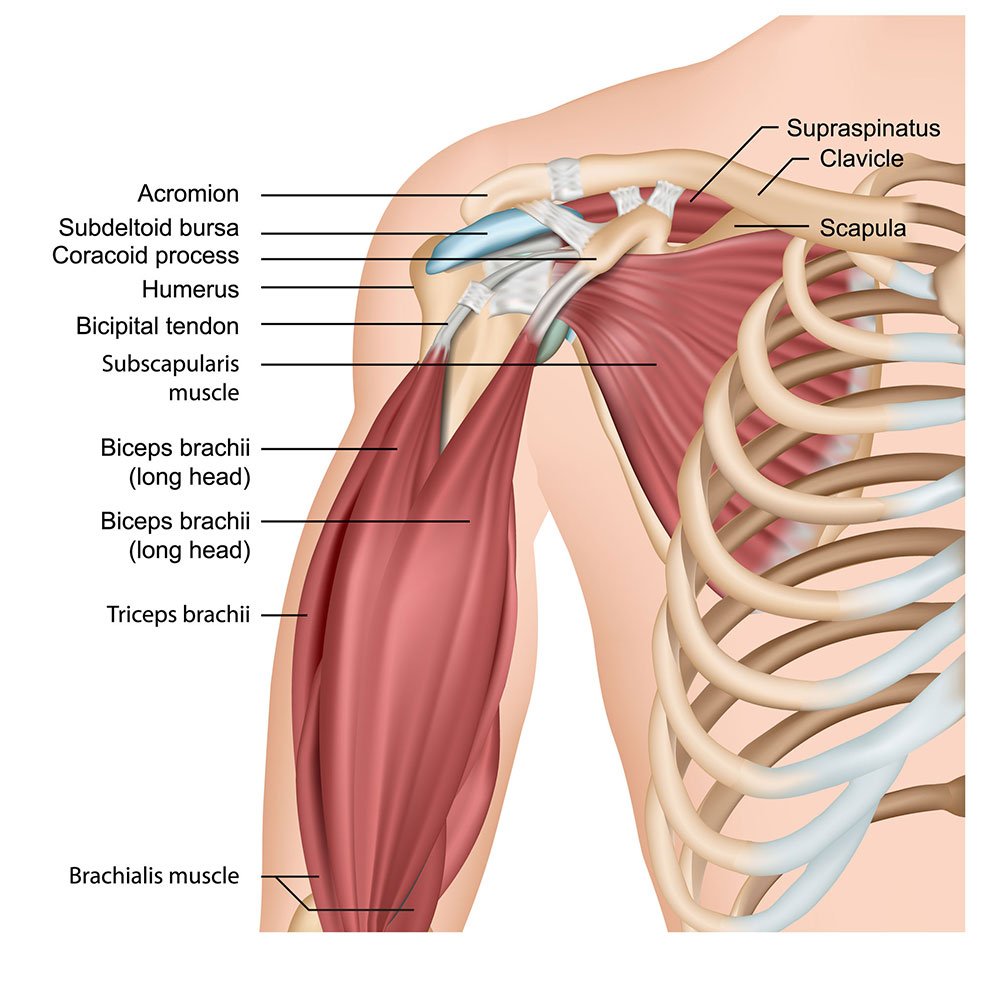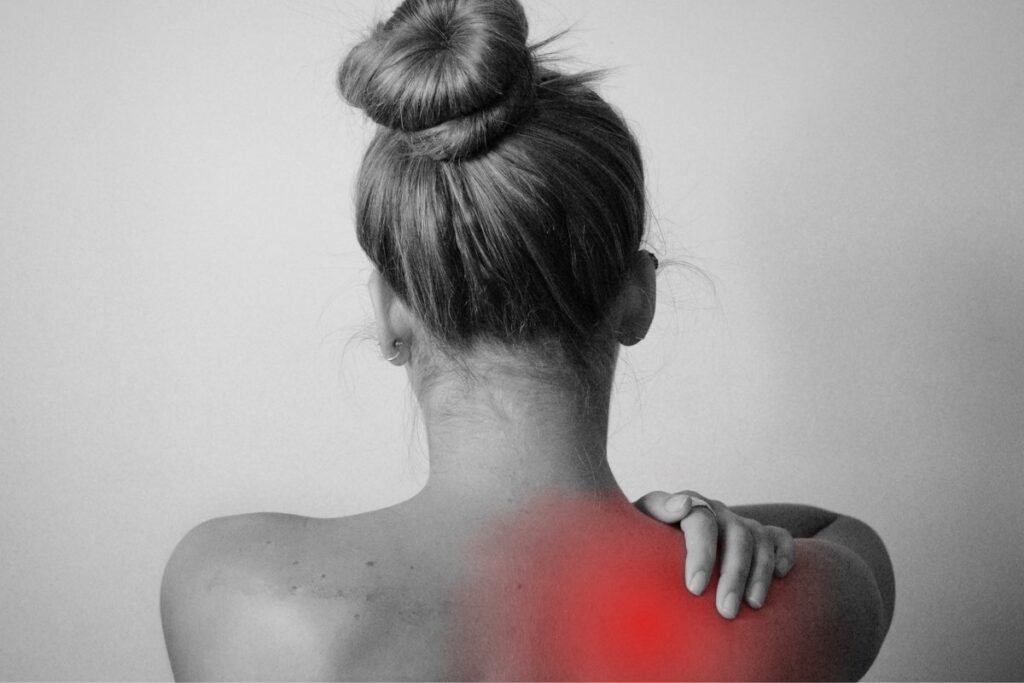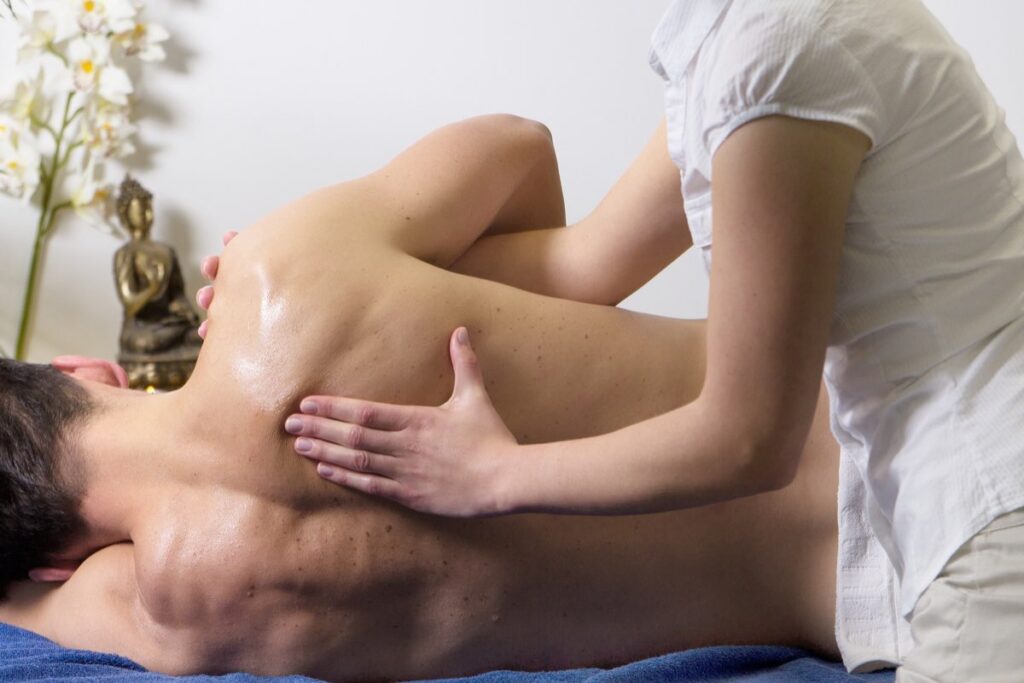Experiencing shoulder blade pain? It might be scapular dyskinesis.
Shoulder pain is a common complaint in active and non-active people, alike. Musculoskeletal issues, such as overuse, strains, rotator cuff issues, poor exercise form and even sleeping awkwardly, can all cause pain in and around the shoulder blades. While arthritis, heart and lung conditions, shingles, gallstones and even liver disease can manifest as shoulder blade pain, these conditions are much less common causes of shoulder pain than musculoskeletal issues.
If you’re experiencing shoulder blade pain, pain between your shoulder blades or pain under your shoulder blades, it may be due to scapular dysfunction – officially known as scapular dyskinesis.
What is scapular dyskinesis?
Put simply, scapular dyskinesis is the abnormal function or mobility of the scapula (shoulder blade) within the shoulder joint.
The shoulder joint is a ball-and-socket joint made up of three bones: the humerus (upper arm bone) the scapula (shoulder blade) and the clavicle (collarbone). The top of the humerus forms the ball that sits within the glenoid (socket) of the scapula. While a complex system of muscles and tendons – including the rotator cuff – holds this ball-and-socket in place, the scapula acts as an anchor site for multiple muscles around the shoulder. The font of the shoulder blade (acromion) also attaches to the clavicle to create the acromioclavicular (AC) joint.
Scapular Dyskinesis and Common Shoulder Pain Causes
The scapula is designed to move in connection with your arm in order to keep the shoulder’s ball-and-socket joint in proper alignment. If an injury, stress or strain to the muscles or tendons in the shoulder causes weakness or imbalance, the position of the scapula can be affected. This, in turn, can cause limited mobility and shoulder blade pain.
Scapular dyskinesis: the surgeon’s perspective, an article published in the NIH’s US National Library of Medicine, concluded that there are high correlations between specific shoulder injuries and scapular dyskinesis:
- Labral injuries
- Shoulder impingement (also known as swimmer’s shoulder)
- Rotator cuff injuries
- AC joint injures
- Clavicle fractures
In addition to the acute injuries above, musculoskeletal issues – weak, tight or detached muscles that control the scapula – are the most common causes of shoulder blade pain.
These musculoskeletal issues are often attributed to overuse, repetitive motions (such as throwing or serving) and poor overhead movement mechanics. Scapular dyskinesis can also be caused by injuries to the nerves that supply these muscles.
Common Symptoms
Typical scapular dyskinesis symptoms include:
- Weakness in the arm on the affected side – including the arm feeling “dead” or “heavy”
- Pain and/or tenderness on and around the shoulder blade, particularly on the inner (medial) edge and at the top of the scapula
- Limited range of motion (unable to raise the arm above shoulder height)
- Unnatural “snapping” or “crunching” sound with shoulder rotation and movement
- Visible “winging” (protrusion) of the shoulder blade
- A drooped shoulder posture on the affected side
- Fatigue with overhead and/or repetitive movements
Scapular Dyskinesis Tests & Diagnosis
An orthopedic shoulder specialist will go over your symptoms, injury history, medical history and he or she will conduct a visual examination to look for tightness, weakness or signs of injury.
Manual Muscle Testing
This tests the strength – or lack thereof – in your shoulder and scapular muscles to determine if muscle weakness is a contributing factor to your shoulder pain and abnormal scapular positioning and/or motion.
Scapular Assistance Test (SAT)
The scapular assistance test helps determine if your muscles are strong enough to raise your arm on the affected side. Your shoulder doctor will apply pressure to your shoulder blade, helping it move up upward as you raise your arm. If your range of motion increases and your symptoms decrease, it is a good indication that the muscles are too weak for proper function.
Scapular Retraction Test
The scapular retraction test helps determine if scapular dyskinesis is present. Your doctor will push down on your extended arm to test its strength. Next, he or she will manually move the scapula into a retracted position and repeat the strength test. If your strength improved with the scapular manipulation, you most likely have scapular dyskinesis.
Finally, your orthopedic shoulder specialist will order X-rays, a CT scan or an MRI if he or she believes you may have an injury elsewhere in your shoulder or if you have any bony abnormalities on your scapula.
Scapular Dyskinesis Treatment & Surgery
Most cases of scapular dyskinesis can be treated with nonsurgical options, including nonsteroidal anti-inflammatory drugs (NSAIDs) to relieve pain and inflammation and physical therapy to strengthen the muscles that move and stabilize the scapula while stretching the muscles that are limiting full scapular mobility.
Scapular dyskinesis typically does not require shoulder surgery. If your condition was caused by a traumatic injury to the joint or surrounding muscles and tissues, your orthopedic shoulder surgeon may recommend surgical options followed by physical therapy.
If you have any questions about scapular dysfunctions, shoulder pain or your shoulder injury, please contact us and we’ll be happy to help.



13 Comments
Permalink
I have had offered on intense scapular pain since severe of whiplash injury at age 18. It has recently progressed worse and worse pain is almost 10/10 along with Myriad of other symptoms. I feel like there is a pinched artery, vein, or nerve somewhere in the scapular area neck or left side vertebral leading to scapula. Possibly the suprascapular nerve or dorsal scapular nerve? Or arteries? I cannot be up right or the pain is so severe and I get a myriad of other symptoms causing me to be bedridden.
Permalink
Hi Sheena,
Sorry to hear you’re in so much pain. The best way to proceed would be to get an MRI to evaluate for a pinched nerve. If you have not had a recent x-ray, it would be a good idea to get that as well to rule out any musculoskeletal injuries or arthritis. To get an MRI you will need to get an order from either your primary care provider or a sports medicine or orthopedic doctor. If you do not have a primary care provider, we have sports medicine and orthopedic doctors at our office that would be happy to help you. Simply call (435)615-8822 and we will get you taken care of! Wishing you the best of luck with your recovery.
Permalink
Scapular pain at apex and inability to sleep on left shoulder. In 2014, bike accident and separated the left AC Joint. It scarred into place. No treatment b/c I needed to use crutches for the tib/fib fx, so the AC was left to heal without treatment. In 2020, I fell on slick ice twice and both times landed on my left elbow pushing the humerus upward (stoving it). Didn’t notice much pain in the elbow, but gradually noted pain in the apex of the left scapula only. Then, it began to be painful to sleep on the left shoulder (side sleeper). I always seem to have a dull, achy pain at the apex. Don’t note any winging or weakness or decreased range of motion. Just can’t figure out what causes the pain. Wish I could sleep comfortably on my left shoulder once again.
Permalink
Try strengthening the upper trap, rhomboid, rotator cuff muscles to see if better dynamic stabilization of the scapula will help with the pain. Generally, avoid pushing overhead, i.e., shoulder presses above the head.
Permalink
I have p. M. R so am use to pain in neck and shoulder s but had to move house and packed and lifted and did stuff I would not do because of my p.m.r .now I am in agony with pain across my upper back chronic pain all down shoulder blades and so sore it hurts to do any thing only get restspite when asleep then afraid to move on waking up it hurts so sore what is your morning like on wake up ..
Permalink
Hi Marian,
If you are in extreme pain I highly recommend getting into a doctor asap for effective diagnosis and treatment. We unfortunately do not have any back doctors that are taking new patients at the moment. So I would recommend reaching out to Dr. Craig Davis with Granger Medical. His office phone number is (801)569-5520. Wishing you a speedy recovery!
Permalink
upper medial center and lower scapular pain as if an ice pick is stabbing me in my mid and medial scapular, thus causing pain in my entire rt. Rib cage and across the back of my neck.
Permalink
I feel this same thing..i had a compression fracture in my upper back…it was 20 yrs ago and the pain is just as bad now than then …
Permalink
Thank you for this information…. I have been sick with this disease for years… and the diagnosis was different for every doctor I go to… I want to know the exercises required to relieve shoulder pain and trigger points.
Permalink
Foremost, thank you for the very fruitful informations in this conversation thread.
Highly appreciated your if you can give me an explanation and advise regarding my discomfort movement of my Scapula Muscles and Triceps Muscles. Its painful when I rotate it with resistance forehand. Like when I do Smashing in Badminton sometimes I feel like I want to release or let the racket unhold by my hands because I feel something radiates from my arms when I smash.
Forehand is painful but, backhand is normal and fine.
Please let me know why and I will be very grateful if you can give me an advise on what treatment is best or what exercise that I must do.
Thank you very much.
Permalink
It’s great to hear that you’ve found the information helpful! Your discomfort with the movement of your scapula and triceps muscles could be due to various reasons, such as muscle strain, overuse, or even an underlying issue like tendonitis or shoulder impingement. To address this, it’s crucial to first consult with a healthcare provider, preferably a sports medicine specialist or a physical therapist, who can assess your condition accurately. They may recommend a combination of treatments, including rest, ice, and possibly physical therapy exercises to strengthen and stretch the muscles around your shoulder and triceps. Avoiding activities that exacerbate the pain and modifying your badminton technique, if necessary, can also be helpful. Remember to always warm up properly before playing and to listen to your body to prevent further injury.
Permalink
I face scapular pain since 14 but i don’t know the reason. I also had no injury now i am 20 but i still feel savor pain in my shoulder. I did not take any medication or recommendation because i don’t know what kind of pain is this.
Permalink
Hi Anmol,
Scapular pain can be concerning, especially when it persists without an obvious cause or injury. We recommend consulting with an orthopedic specialist to determine the underlying cause of your pain. It’s important not to ignore persistent pain, as early intervention can lead to better outcomes.